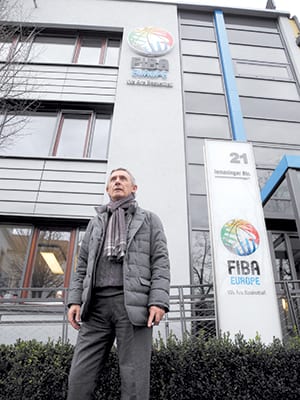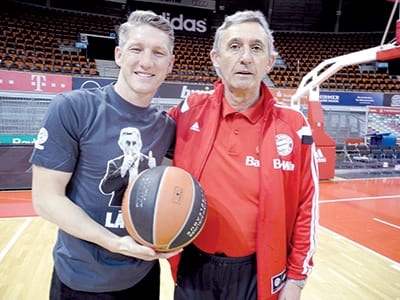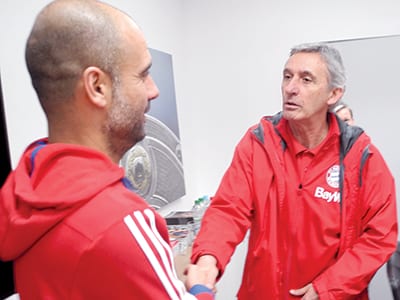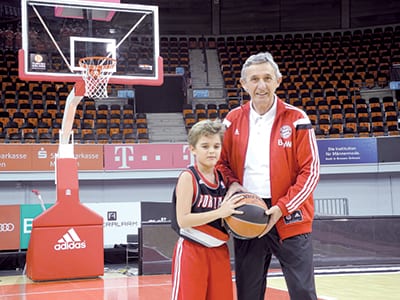Svetislav Pešić, one of the world’s best basketball coaches, driven by the challenge of making Germany a European and world power in basketball, arrived at the German Basketball Federation precisely 30 years ago, and as early as the first press conference he stated that Germany would become European champions in basketball.
Not knowing Svetislav Pešić, many interpreted this claim as a joke, but it was only a few years later, at the European Championships, EuroBasket 1993, led by Pešić, that Germany became European champion. To reach gold, the Germans had to change their entire system of playing basketball, utilising the Yugoslav model the most. “I consider that one Svetislav Pešić and one Dirk Nowitzki can be placed in the same basket, although in different roles. Dirk Nowitzki is, of course, a world-class player, who, due to his playing method and sparkling success, has become a beacon for German basketball. He’s a great athlete, who has done everything in an extraordinary way. On the other hand, you have a different man and profession. Pešić is our coaching beacon, who in principle did the same thing for German basketball as Nowitzki, only in a different role. I’m sure that German basketball will always cite these two greats of men,” said Ingo Weiss, President of the German Basketball Federation.
This statement perhaps best testifies to that which Serbian coach Svetislav Pešić has done for German basketball. Not only did he lead the team to its greatest success – gold medal at “Eurobasket 1993” in Munich – he also fundamentally changed the way of thinking of both players and people in the management of the Federation.
-I remember clearly when Sveti – as we call him – first came to Germany three decades ago. At that time, at a meeting in Hagen, speaking bad German and using just a few words, he sought to explain what was needed to make basketball better, to revive basketball in Germany – says Weiss. – Sveti gave us a vision of what we wanted to achieve in basketball and how to achieve it.

Pešić arrived in Germany immediately after the 1987 Youth World Championships in Bormio, Italy, when he won gold with the most talented generation in the history of European basketball. Playing for Yugoslavia back then were Vlade Divac, Aleksandar Đorđević (today coach of Bayern Munich), Toni Kukoč, Dino Rađa, Teoman Alibegović (later one of the key players for Pešić’s Albi from Berlin) … Pešić also led them to be cadet (1985) and junior (1986) champions of Europe, and behind him, he also had the title of champion of Yugoslavia, conquered with Bosna from Sarajevo, in one of the most controversial finals of that league (1983). During that championship in Bormio (August 1987) he already had an unexpected visit from Germany…
– We met for the first time that summer in Bormio. The German Basketball Federation gave me the task of talking to Pešić about coming to take on the role of the selector – says one of the fathers of Croatian basketball, Branimir Volfer, German national selector of 1961-62. – When I saw the kind of group of guys Pešić was leading, it was clear to me that he was an exceptional coach, because why would such a generation, in a basketball force like Yugoslavia, be entrusted to someone average. After the championships, we agreed to meet again. That was two or three weeks later, in Munich. As he had reached an agreement with the people from the Federation, he moved with his whole family to Hagen. He got a German teacher and slowly started getting used to the German way of life.
Svetislav Pešić, alongside Spaniard Manuel Sainz, is the only person in the history of basketball to win the Euroleague (champion’s cup) as both a player and a coach. Pešić won his first title with Sarajevo’s Bosna in 1979 (beating Emerson Varese 96:93 in Grenoble) and his second with Barcelona in 2003 (beating Benetton 76:65 in Barcelona)
In Serbia, they say that Serbs are lazy and Germans are diligent; that Serbs have no organisational sense, while Germans are disciplined and responsible. However, Ingo Weiss says that Pešić has introduced to German basketball precisely those virtues that “Serb’s dream of”:
– What he brought us from Serbia was a message for us to work hard. And he made it clear to us what hard work means. Sveti marked German basketball with his successes, while the title of 1993 European champions, his great achievements that he later had in German basketball. If that were to be described in fairy-tale terms, we would say that he woke us from a deep sleep. Basketball received such zest among the youth, who listened to the coach carefully. But not only what he says, but instead also what he teaches them, how to live basketball and prolong its life in Germany.

Weiss adds that Pešić was “someone in Germany who took care of the education and training of German coaches, who followed him closely”, but also “took care to enable many people from Serbia to come and bring their expert knowledge, and thus German basketball owes him a lot”. Pešić agrees that his mission was perhaps the most important thing; that he was ready to awaken love and passion for basketball in every corner of Germany. With a smile, he recalls that on the first day, in “Tarzan English”, he said that the goal was to win the title of European champions. They all laughed out loud, believing that he didn’t know what he was talking about. However, it all became clear to them a few years later…
– I recall that I got an “Opel Omega”, as Opel was the sponsor of the Federation, which I drove all over Germany. There is no place I didn’t visit. In small towns, big cities … What greeted me everywhere was a doubt that German basketball could ever represent something significant in European or world basketball. It was first necessary to shake up the players, to show them the goal and give them a vision of what they can do with hard work. That’s because players are a coach’s greatest ambassadors. When I had won over one group of players, everything was later much easier. They saw that these were not like the training sessions they’d had before, that they could learn a lot; that they could advance. Then the first victory came, then the second… Something happened. Of course, there were also defeats that the players – as mattered to me – experienced very emotionally. They simply saw that defeat could also push them forward. That’s how that 1993 European Championships also started with a defeat. When we finally beat Russia in the final, no one believed it was happening. I watch journalists, players, all those faces … People celebrating and not believing. It was like that was all happening to someone else, not to us…

Creating a cult national team lasted a full six years, all the way to “Eurobasket 1993”. Pešić was the basketball enlightener who propagated his “faith” 24 hours a day. At every opportunity, at every moment. He was also worried about things that others didn’t care about, that others thought were beyond resolving. Thus, for example, in an unusual way he convinced Detlef Schrempf – then undoubtedly the greatest star of German basketball (then a member of the Indiana Pacers and a three-time member of the NBA All-Stars team) – to come and play for his national team. Players from the biggest leagues didn’t come to join a team destined to fail, and so Schrempf also doubted that anything could be changed in that.
However, Pešić wanted Schrempf at any price for the 1992 Barcelona Olympic (qualifying for this tournament was Pešić’s first great success with Germany). At one seminar of Bundes trainers, he met his countryman Nikola Pilić, creator of Germany’s tennis boom and then selector of Germany’s Davis Cup team. Complaining to him about how he could not get Schrempf, he instantly received a complete plan of how to coax him to come.
Pešić is the only coach to have won all FIBA competitions. Those are the European Championships for Cadets (Ruse, Bulgaria, 1985), the European Junior Championships (Gmunden, Austria, 1986), the World Youth Championships (Bormio, Italy, 1987), the European Senior Championships (Munich 1993, Istanbul 2001) and the World Senior Championships (Indianapolis, U.S., 2002)
– I told Pešić that I thought I could help him with Schrempf – says Pilić, who moved his tennis academy from Munich to Croatia’s Opatija three years ago. – I knew that Boris Becker and Detlef Schrempf are friends, and since Becker practically lived in my academy at the time, I told Pešić to come to me in Munich and that we would then come up with “tactics” for Schrempf. And so one day Becker, in the presence of myself and Pešić, called Schrempf. He told him, more or less, that he would like them to appear together at the 1992 Barcelona Games, that this would be an excellent opportunity for both of them … And so Schrempf appeared in the national team.
After “Eurobasket 1993”, Pešić received a great offer from Caserta. He had an oral agreement with the president of that Italian club, Giancarlo Sarti, but one call from Berlin changed his plans. President of the basketball club Alba, Dieter Hauert, wanted to bring a coach to Berlin who can realise great dreams, and his club was then only celebrating its second birthday (it was established 1991). He called Pešić and shared his vision of the European Alba with him. Pešić immediately called Sarti and told him he would be staying in Germany after all, but not in Hagen (headquarters of the German Basketball Federation), instead in Berlin.
 Alba’s golden age followed. With Peščić, the club won the European Korać Cup (1995), which is still the only European trophy won by a German basketball club, then four national league titles (1997, 1998, 1999, 2000) and two national cups (1997, 1999). After all of that, he was declared an honorary citizen of Berlin.
Alba’s golden age followed. With Peščić, the club won the European Korać Cup (1995), which is still the only European trophy won by a German basketball club, then four national league titles (1997, 1998, 1999, 2000) and two national cups (1997, 1999). After all of that, he was declared an honorary citizen of Berlin.
– When you describe Svetislav Pešić, you can’t just describe him as a great coach. For me, he has always been an extraordinary man who played a unique role in my career, as a man who led me in different spheres of life. In a way, he is like a father, like a figure in many things. It wasn’t always easy to be under his control or to be with him, but I always had the impression and feeling that he was interested in that not only for the team to win, but also for me to develop as an individual, both in sport and in life. He taught me how to become a professional in my sport, what it means to suffer martyrdom for success in this sport – said former German national team and Albe player Henrik Rödl, today assistant coach of the German national team.
Pešić framed his mission in Germany with Bayern, with which he won the 2014 Bundesliga title. He came to this club, which was practically amateur until 2011, at the invitation of his son, Marko, the club’s general manager, and Bayern Munich FC president Ulrich Hoeneß. Under Pešić, Bayern won its first title after six decades (since 1955), and the “Audi Dome” became a temple of basketball. Many well-known names were supporting in the first row. Among them was a great footballer and basketball fan Bastian Schweinsteiger, for whom Pešić was great inspiration for the 2014 FIFA World Cup in Brazil. A few weeks after the final of the basketball Bundesliga, Bayern FC’s German national football players appeared in Brazil earing t-shirts displaying Pešić’s face.

– Mr Pešić is always there for us, from morning to night. Not only during matches but also at training. He always drags everything around him to advance. And when you lose, then a new match follows, which can be won. He is a man who thinks positively. We footballers from Munich wore t-shirts showing his face, and we went well in Brazil. We became champions – said Serbian Son-in-Law Schweinsteiger (husband of former ladies tennis world No.1 Ana Ivanović).
Branimir Volfer summarises the story of Pešić’s three-decade-long mission in Germany:
– Someone once said that football is a game in which two teams play, and Germany always wins. I would say that in basketball this is a game in which Pešić always wins!
Basketball family
The Pešićs are a real basketball family. The first trophy was won by his wife, Vera, who became a champion of Yugoslavia in 1971 with basketball club Željezničara from Sarajevo. Their two children, son Marko and daughter Ivana, also played basketball. After an international career, Marko is today general manager at Bayern.